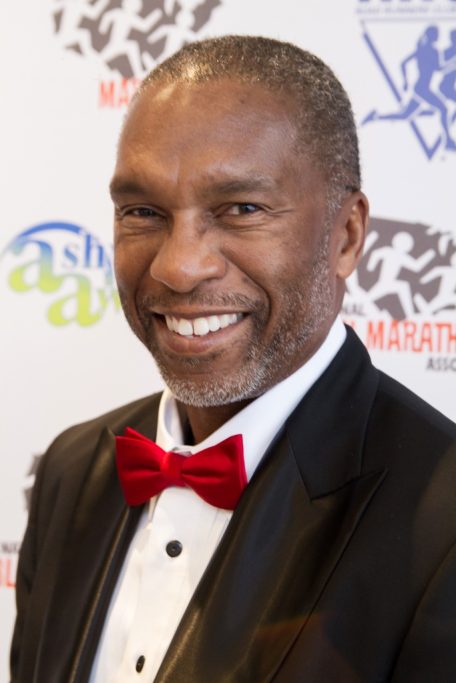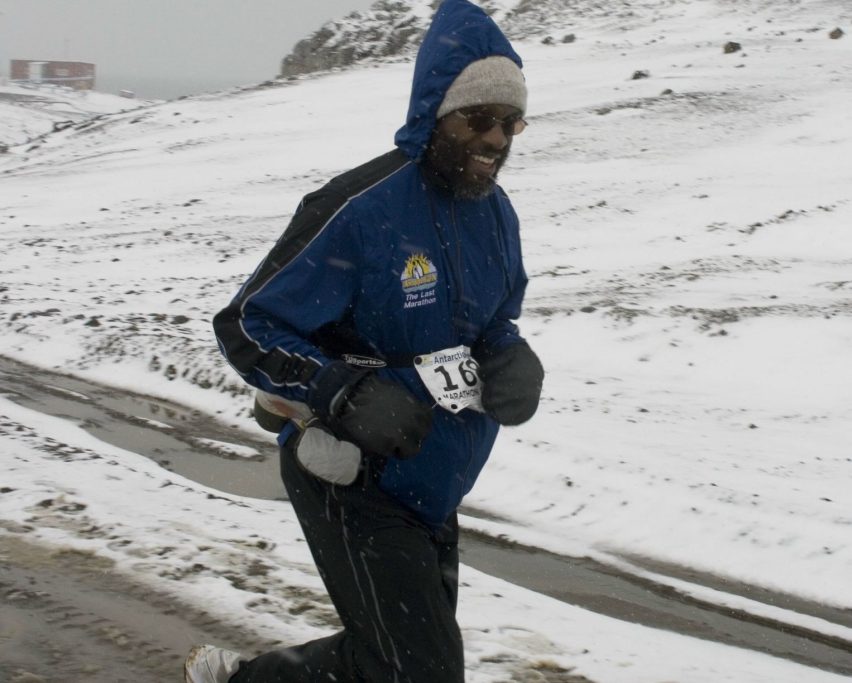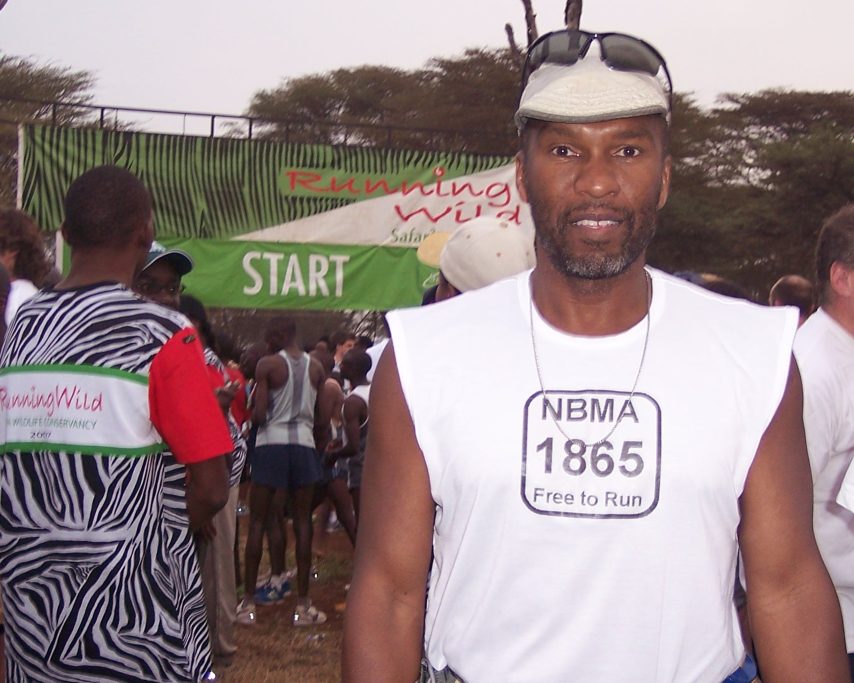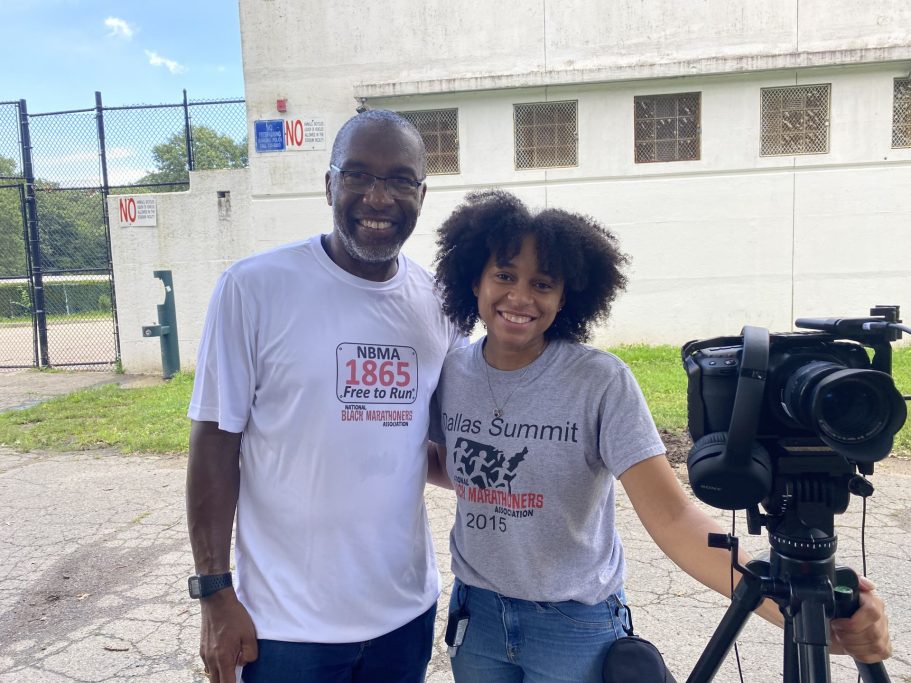Driven to Run: A Journey Marked in Miles
October 12, 2022

By any reckoning, Tony Reed MS’92 is a serious runner. He has logged more than 48,750 miles since beginning a daily running journal 43 years ago. That’s just short of the distance needed to circle the Earth – twice. But Reed’s amassed miles, longevity and honors as a runner are just one aspect of what he represents to a large community of distance runners. He has become an inspiration for runners of all ages and a voice for the prominent place of African American distance runners in the sport’s history.
The 67-year-old amateur athlete is best known for completing what’s called the marathon hat trick, a nearly unimaginable goal of many distance runners. To complete the hat trick, Reed ran a marathon on each of the world’s seven continents – becoming not just the first African American to do so but the first Black runner to accomplish the feat – while also completing marathons in each of the 50 states and finishing more than 100 marathons. In fact, he has run 132 of the 26.2-mile races.

Reed is also the elder statesman for the African American distance running community. He co-founded and is executive director of the National Black Marathoners Association and has written several books and articles about distance running. Last year he directed and produced an award-winning documentary featuring an elite group of African American female runners who have ran sub three-hour marathons.
Reed grew up in St. Louis as part of an active, athletic family. He became especially aware of fitness and health when, as an 8-year-old, he was diagnosed with a prediabetic condition.
“The doctor said that by the time I became a teenager, basically when I got into high school, I would probably have to start taking insulin,” Reed said.
But all through his school years Reed swam, biked and played sports – including four years of high school soccer. High school came and went without the need for insulin. While attending Washington University in St. Louis, Reed read books by Dallas physician and aerobic exercise expert Kenneth Cooper about the impact of fitness on health and preventing disease, including diabetes.
“In 1976, I made a lifetime goal of running or walking 3 miles a day.” Reed said. “In 1979, I started a running journal, and in that time, I’ve run more than 48,500 miles, which averages a little over 3 miles a day. I’m 67, and I’m still not on insulin.”
After transferring to and graduating from Webster University with degrees in math and business, Reed became a computer programmer and moved to Texas to pursue a Master in Business Administration at Texas Christian University. It was there in 1979 that he encountered runners competing in the first Fort Worth Cowtown Marathon, which crossed the TCU campus. Inspired, he decided to run the marathon and began training. In 1981, he ran the Cowtown 10K race and the next year completed the marathon, his first.
It was while preparing for the Cowtown Marathon that other runners told Reed he was physically too big to compete in marathons and that he should try shorter events. He was also told if he couldn’t finish a marathon in under four hours, he shouldn’t even be at the starting line.
“I’m thinking to myself, they don’t know anything about me. They don’t know anything about my training,” Reed said. “I don’t like being limited to a box that people want to put me in.”
He finished his first Cowtown Marathon in 3 hours, 59 minutes, 23 seconds. Soon after, he started running the Dallas Marathon and estimates he’s now run the Dallas and Cowtown races 20 times each.
Reed didn’t finish his degree at TCU but did complete an MBA at Abilene Christian University while working as a computer programmer for a variety of Dallas-area companies, including Texas Instruments where he ran on TI’s employee road racing team. In 1989, he enrolled at The University of Texas at Dallas to earn a master’s degree in accounting.
Reed said he is driven in life by proving himself. As a marathon runner, he has done just that by completing near impossible goals, the most ambitious of which is the marathon hat trick, which according to Reed has been accomplished by fewer than 60 people in the world.
In completing his seven continental marathons, Reed ran a race that included a section of the Great Wall of China, and ran an entire marathon on ice and snow in Antarctica with spikes attached to his running shoes. He finished the last of his seven continental marathons in African in 2007 running through a wildlife preserve in Kenya.

“When I finished that last marathon, I just started crying,” Reed said. “The pressure was off, and I knew I had just ended up making history.”
Runner’s World magazine profiled Reed in February 2008 as the first Black distance runner to complete a marathon on all seven continents, but the real honor came in 2012 when the Smithsonian Institution Museum of African American History and Culture in Washington, D.C., asked him to donate his running clothes from the marathon in Kenya to the museum’s collections. He was also interviewed by The History Makers, an organization that collects recorded interviews with prominent African Americans for preservation in the Library of Congress.
“The fact that the Smithsonian wanted my running clothes just took my breath away,” Reed said. “It is something that I couldn’t imagine, but it ended up happening.”
Now retired, Reed continues to run daily and completes a few marathons each year. In 2022, he was inducted into the Distance Running Hall of Fame by the Road Runners Club of America. He also continues to represent African American distance runners as director of the National Black Marathoners Association and last year produced and directed the documentary, “Breaking Three Hours: Trailblazing African American Women Marathoners.”
Inspired by a 5,000-mile road trip he and a friend took last spring to reunite with running friends around the country, the film profiles women who are members of an elite group of marathon runners who have broken the sport’s daunting three-hour barrier.
“Fewer than 20 U.S.-born, African American women have broken three hours in the marathon,” Reed said. “There’s a strong need for African American women role models in distance running. An awareness of these women may lead to the growth of young girls pursuing cross country and the long distances, as well as encouraging women to pursue distance running to improve their health.”

Reed and videographer Kayla Key introduced the documentary to members of the National Black Marathoners Association at the 2022 Boston Marathon, and he has since submitted it to film festivals around the country. In September, the film won first place for Best Sports Documentary and first place for Best Soundtrack at the Seattle Film Festival.
Reed plans to premiere “Breaking Three Hours” to Dallas audiences in January 2023 while also making it available through video-on-demand streaming services.